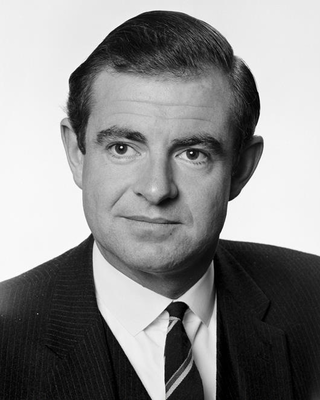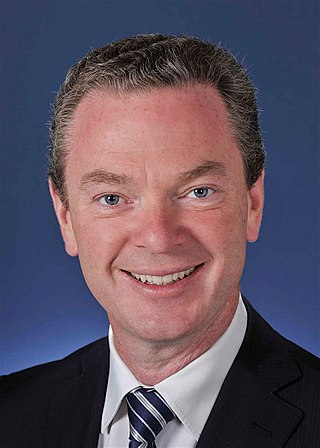
The House of Representatives is the lower house of the bicameral Parliament of Australia, the upper house being the Senate. Its composition and powers are set down in Chapter I of the Constitution of Australia.

The Parliament of Australia is the federal legislature of Australia. It consists of three elements: the monarch of Australia, the Senate, and the House of Representatives. It combines elements from the Westminster system, in which the party or coalition with a majority in the lower house is entitled to form a government, and the United States Congress, which affords equal representation to each of the states, and scrutinises legislation before it can be signed into law.

The 1996 Australian federal election was held to determine the members of the 38th Parliament of Australia. It was held on 2 March 1996. All 148 seats of the House of Representatives and 40 seats of the 76-seat Senate were up for election. The centre-right Liberal/National Coalition led by Opposition Leader John Howard of the Liberal Party and coalition partner Tim Fischer of the National Party defeated the incumbent centre-left Australian Labor Party government led by Prime Minister Paul Keating in a landslide victory. The Coalition won 94 seats in the House of Representatives, which is the largest number of seats held by a federal government to date, and only the second time a party had won over 90 seats at a federal election.

In Australian federal politics, the Leader of the Opposition is an elected member of parliament (MP) in the Australian House of Representatives who leads the opposition. The Leader of the Opposition, by convention, is the leader of the largest political party in the House of Representatives that is not in government.

Margaret Elizabeth Reid is an Australian former politician who served as a Senator for the Australian Capital Territory (ACT) from 1981 to 2003, representing the Liberal Party. She held her seat for nearly 22 years, winning eight consecutive elections. Reid is the first woman to have served as President of the Senate, Australia's third-highest political office.

The Liberal–National Coalition, commonly known simply as the Coalition or the LNP, is an alliance of centre-right to right-wing political parties that forms one of the two major groupings in Australian federal politics. The two partners in the Coalition are the Liberal Party of Australia and the National Party of Australia. Its main opponent is the Australian Labor Party (ALP); the two forces are often regarded as operating in a two-party system. The Coalition was last in government from 2013 to 2022. The group is led by Peter Dutton, who succeeded Scott Morrison after the 2022 federal election.
Raymond John Groom is an Australian lawyer and former sportsman and politician, representing the Liberal Party in the Federal Parliament 1975–84 and the Tasmanian Parliament 1986–2001. He was a Federal and state minister for a total of 13 years. He was Premier of Tasmania from 1992 to 1996 and also served as Deputy Premier and Attorney-General.

The 1989 Australian Capital Territory election was held on 4 March 1989 to elect the 1st Australian Capital Territory Legislative Assembly. This was the first direct election by voters in the Australian Capital Territory (ACT) for their power legislative body.

Mark Alfred Dreyfus is an Australian politician and lawyer who has been attorney-general of Australia and cabinet secretary since June 2022, having held both roles previously in 2013 and from 2010 to 2013 respectively. Dreyfus is a member of the Australian Labor Party (ALP), and has been the MP for Isaacs since the 2007 election.

Neil Anthony Brown is an Australian former politician. He was deputy leader of the Liberal Party and deputy opposition leader from 1985 to 1987, under John Howard. He served as Minister for Employment and Youth Affairs (1981–1982) and Minister for Communications (1982–1983) in the Fraser government.

Christopher Maurice Pyne is a retired Australian politician. As a member of the Liberal Party, he held several ministerial positions in the Howard, Abbott, Turnbull and Morrison governments, and served as a member of parliament (MP) for the division of Sturt from 1993 until his retirement in 2019.

Robert Bruce Whan was an Australian politician. He was a member of the Australian Labor Party (ALP) and represented the Division of Eden-Monaro in the House of Representatives from 1972 to 1975. He worked in the wool industry before entering politics.

Walter Maxwell Nairn was an Australian politician. He was a member of the Australian House of Representatives from 1929 to 1943, representing the electorate of Perth for the Nationalist Party of Australia and its successor the United Australia Party. He was the Speaker of the House from 1940 to 1943.
Kenneth James Aldred was an Australian politician who represented the Liberal Party in the Australian House of Representatives between 1975 and 1980 and again from 1983 to 1996.
Michael Ehrenfried Baume is a former Australian politician. A member of the Liberal Party, he served in the House of Representatives from 1975 to 1983 and as a Senator for New South Wales from 1985 to 1996. He was a parliamentary secretary in the Fraser government and was later a shadow minister. He was a business journalist and stockbroker before entering politics and later served as the Australian consul-general in New York City from 1996 to 2001.
Stephen James Irons is an Australian politician. He was the Liberal member of the Australian House of Representatives representing the electoral Division of Swan in Western Australia from the 2007 federal election to his retirement at the 2022 federal election.
Peter David Falconer is a former Australian politician. He was a member of the House of Representatives from 1975 to 1983, representing the seat of Casey for the Liberal Party.

William Robert Lawrence was an Australian politician and dentist. He was a member of the House of Representatives from 1949 to 1958, representing the Victorian seat of Wimmera for the Liberal Party. Before his election to federal parliament he served as mayor of Horsham, Victoria.

Adrian Gibson was an Australian lawyer, politician and businessman. He was a member of the House of Representatives from 1964 to 1969, representing the Tasmanian seat of Denison for the Liberal Party.
Samuel Thomas Rae is an Australian politician and a member of the Australian House of Representatives for the new seat of Hawke. He was first elected at the 2022 Australian federal election. Prior to his election he was a state secretary for the Labor Party and a partner at PwC.